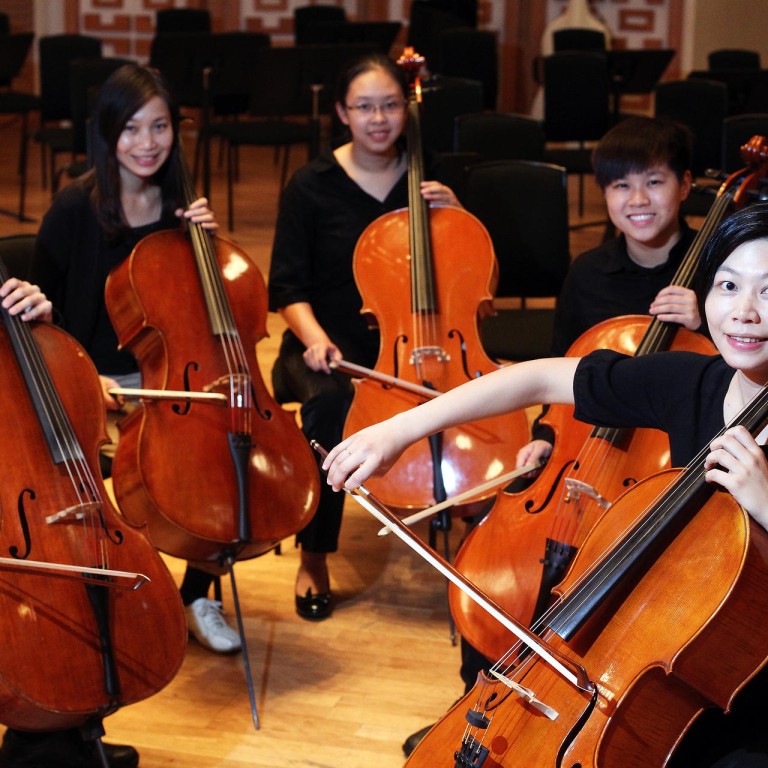
Hundred-cello event gives young players a chance to enjoy music
Young cellists get to play without competing for recognition
Having more than 100 cellists play together can be a stirring spectacle. For Charis Chan-ching, a first-year medical student at Chinese University, it was even more thrilling because she was part of it.
"It was amazing. I was thrilled to play alongside the professionals. I have only performed in some school competitions and with smaller groups. It was nothing like this," 18-year-old Chan says of the Celebrating Cello event, which marked the 10th anniversary of Hong Kong International Cello Association.
The concert at the Cultural Centre on October 23 was intended to be inclusive - there were just 20 professionals among the 104 cellists, whose ages ranged from 10 to 85 years of age. Even so, enthusiasts like Chan were anxious to deliver a smooth performance.
"You learn a lot by playing with the professionals," says Mak Chung-sze, a 37-year-old primary school teacher who picked up the cello 15 years ago.
"You can see how they control their volume and their bowing techniques. You're also motivated to practise much harder because you don't want to be too bad when you're playing with them."
That's part of the mission of the association, set up by a group of young cellists in 2005 as a platform for all who love playing the cello.
"We wanted to promote cello playing and appreciation for its own sake; there are no commercial aspects to our association," says Letty Poon, a co-founder who now serves as artistic director. "We organise talks, ensemble classes and performances for cellists of all ages, levels and abilities, and family backgrounds."
A sought-after musician who also teaches at Baptist University and the Academy for Performing Arts, Poon fell in love with the instrument at the age of seven, when she started taking lessons through the government's Music Office.
"In the 1980s, the cello wasn't a popular choice. When I registered for the cello programme then, I didn't know what it was like to play the instrument, even though I could play the piano.
"But when I held a cello in my arms for the first time, I felt warmth. It was like holding my mother. I talk to my mother about everything. When I play the cello, I can express all my emotions, so it's like talking to my mother," she says.
The young cellists at the association's anniversary event are familiar with that feeling. "I don't know why I fell in love with the cello but I've been playing it since I was six," says Chow Kung-chi, 15, a Form Four student who is in the APA's junior music programme.
"My cello is like my best friend; it helps me release my study pressure. We have so many tutorial classes to attend after school, but when I play my cello, my mind is relaxed. When I am unhappy, it helps me to calm down."
Sixteen-year-old Lam Hei-ching says playing the instrument has helped soothe her nerves as she prepares to sit for upcoming public exams.
"The sound of the cello is very energetic. It's like a young person, full of life, and it makes me lively and hopeful," says the student at St Mary's Canossian College. "I also like the cello because it is an important instrument in chamber music and it can be played on its own."
Chan adds: "When I play the cello, I am taken to a different world, away from all the pressures, away from my ordinary life. Music opens up an empty space for me to enjoy the moment and it enriches my life."
Poon says it has been very satisfying to present an alternative to the competitive environment that surrounds children taking up music today.
"In Hong Kong, many people see music and learning an instrument as a tool to achieve something else, like winning a competition," Poon says.
"But music isn't like that. What you gain from the process of learning and appreciating music is not the same, and is much more than what you can get from a competition."
It wasn't easy getting more than 100 people, all with different work schedules and demands, to come together on stage. They were only able to rehearse as group five times before the show, although smaller ensembles practised with a team leader between sessions.
But the association's founders had long dreamed of an assembly of cello lovers, Poon says. "Now we've finally done it. The result was beyond my expectations, and I hope to see it happen again."
She is grateful for the effort that the non-professionals have put into the event.
"I want them to know that if they played with their heart, then that was good enough," she says. "It is not about how well they perform, but about working together to accomplish the task, and enjoying the performance," she says.

